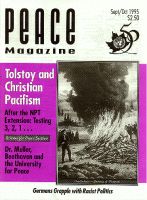
Peace Magazine Sep-Oct 1995, page 29. Some rights reserved.
Search for other articles by John Marshall here
John Keegan. Toronto: Vintage Books 1995
The book opens with a delightful, provocative and revealing chapter on "Controversy and the Second World War". It seems that old certainties are being challenged, revised versions are being exploded, what was thought to be nailed down is coming loose-not a bad situation for adventurous young historians with new ideas and fresh lines of inquiry. Indeed, a point made throughout the book is that there are many important aspects of the war which have received little or no attention from professional historians. This has become evident in recent World War Two historiography in Canada, as scholars engage in bold revaluations (sometimes controversial) of Canadian participation in the war. Interestingly enough, there is scant mention of Canada anywhere in the Keegan book. Perhaps the Canadian contribution is subsumed under the British (imperial) label? Pity.
The remaining chapters are entitled: Histories of the Second World War; Biographies; Campaigns; The Brains and Sinews of War; and Occupation and Resistance. Citations, with minimal bibliographic information, are gathered together (by chapter) at the end.
The focus of the book is quite naturally and legitimately on the military background and the waging of the war. The political background is not neglected, though the approach is, not unexpectedly, fairly orthodox. There is some discussion (from a military point of view) of the Chamberlain policy of appeasement of (if not collusion with) Hitler, prior to the 1939 assault on Poland. But there is little recognition of the origins of the war in the fundamental rupture of the European imperialist order which followed the Bolshevik revolution of 1917. After unsuccessful attempts by Western states (including Canada) to strangle the new regime at birth for two decades, anti-communism emerged as major (though not always openly proclaimed) determinant of foreign policy. By trade and diplomatic means the Soviet state was effectively isolated from the world community. Not until 1934 did the Soviet Union gain membership in the League of Nations, where the Foreign Minister, Litvinov, fought for disarmament and collective security. He also tried to stop the fascist takeover of Republican Spain in the bitterly fought civil war in which Franco received decisive military support from his allies, Hitler and Mussolini. The Soviets opposed the Munich Pact, rightly suspecting that the underlying motive of Chamberlain & Co. was not merely to appease Hitler but to turn the Nazi war machine entirely to the east, into a war with the Soviet Union that Britain and her allies could wholeheartedly support.
Such an outcome was a very real possibility, narrowly averted. Had it happened, a very different history would have been written today. At the least, recognition of this phase of the anti-communist experience throws light on the Cold War of our own time which, although officially ended, smoulders still in various corners of our New World Order. One small complaint: where are the proof readers these days?

Peace Magazine Sep-Oct 1995, page 29. Some rights reserved.
Search for other articles by John Marshall here